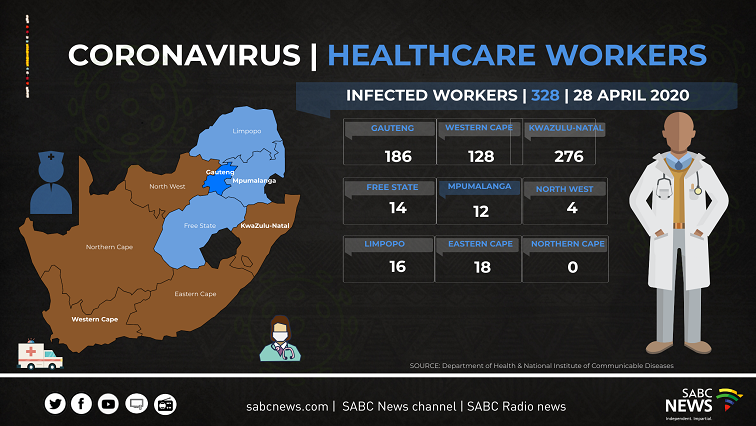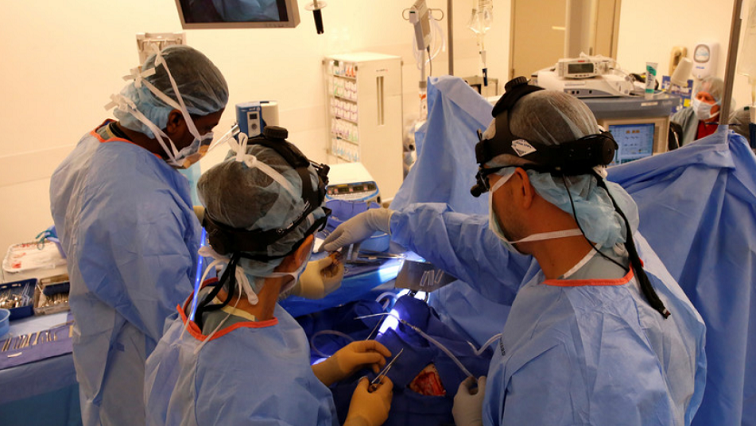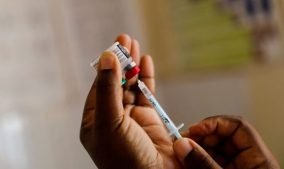Tens of thousands of healthcare workers are on the frontline of the global war against COVID-19.
Many are in the unenviable position of fighting the pandemic, at the risk of their own lives and those of their families.
SABC News captures their voices in this weekly feature, COVID-19 Frontline Workers. This week, Digital News producer Lebo Tshangela (LT) speaks to a neurosurgeon, Dr Ntethelelo Mjoli (NM), who owns a practise at Mediclinic in Newcastle, KwaZulu-Natal, about his experience with the coronavirus during the nationwide lockdown. Although he’s an essential worker, Dr Mjoli is among the thousands of specialists who have lost a lot of work during lockdown.
LT: I asked him about the economic impact of the pandemic on his private practise.
NM: As a neurosurgeon where I’m working I do mostly elective work, so with the lockdown we probably doing close to 5% of the work. This is close to no work that I’m getting because most of what we do is elective. There are very few emergencies that are coming through so that’s all I’m seeing as a neurosurgeon. The practise is almost completely closed. I’ve moved into a new practise so we still starting up so in the first three months we had about 30 patients per month that includes everyone who comes through to the rooms and comes through the hospital. In the last month we had five.
LT: With the numbers of those infected with COVID-19 continuing to rise as more tests are conducted nationally, there is a greater need for health facilities to accommodate the treatment and quarantining of patients. This has adversely affected the scheduling of other medical procedures as well as the business aspect of some specialised healthcare workers. A number of hospitals around the country have stopped performing elective and semi-elective operations. Mjoli says only emergency surgeries are being performed at the Newcastle Mediclinic at the moment.
NM: There is a booklet on it, produced by Sasa (South African Society of Anaesthesiologists) where they have gone through the process of defining what an emergency, what is semi-elective, what is elective surgery, so it is really those that need to have the operation otherwise it will be detrimental to their health imminently and those who will suffer a permanent deficit within the next three months, those are the only cases that are getting done. …So if you are having back pain in three months’ time you will still be alive with your back pain but if you happen to have a brain tumour that is so large that it’s putting pressure inside your brain, you are someone that needs to be helped immediately, so you get a rupture of a blood vessel in your brain you are also someone that needs to be helped immediately, so those sort of people will go into surgery immediately and obviously those that have suffered trauma, that means they will go ahead and have their procedure.
LT: The Newcastle neurosurgeon says the regulations have meant doing away with face-to-face consultations. The closest interaction doctors like him are allowed to have with their patients during lockdown, are video-based.
NM: I do absolutely no consultations, the only work that I am doing is if someone has an emergency and they come through casualty and get admitted that way. I do follow up consults and I don’t go to the rooms. I haven’t been to the rooms since the first day of the lockdown…they have said you can do consults over the internet like these Zoom rooms, that doesn’t work for me, I need to examine the patient to know what is wrong with them, so that consult is not really helpful, but what we can help patients with is that those who need the script, that can be done telephonically and emailed through to them, but that is not something new, we were doing that already in the practise.
LT: The National Treasury says as many as 7 million people could lose their jobs during the lockdown. The Unemployment Insurance Fund has paid out R3.3-billion in COVID-19 relief funding since March 27. Government says it has received 103 000 applications from employers who represent 1.7 million employees. Dr Mjoli says the UIF system is not all that dependable. He says on top of payment issues, his employees who have not been able to work, are also living in fear of contracting the virus from the practise.
NM: So far, this UIF system is a hit and miss, some people get paid and some people don’t. People working in the same establishment. Some get their stuff through, some don’t. It’s end of the mouth, we’ve been through a month with no work so everyone has to go through UIF, you are uncertain whether you will be paid or not, so there is that problem and then now with things beginning to open up there is also issues, what’s been out in the media is just this COVID thing made to seem like something that is extremely deadly, so people are worried about their lives getting out into public, meeting patients again, so the assumption is that you will get it from those who come from hospitals, without realising that it’s everywhere. They are also very concerned about getting back to the office.
LT: A new study provides some of the earliest pieces of evidence that the COVID-19 outbreak affected people mentally as well as physically. The preliminary results published on Science Daily reveal adults in locations more affected by COVID-19 had distress, and lower physical and mental health, and life satisfaction. Mjoli says he finds the lockdown which began on the 27th of March extremely difficult. He says he nearly went into depression.
NM: It taught me one thing, to obey the law; I cannot afford to be arrested. I need my liberty. I’m finding it extremely difficult, I’m fortunate in that I can at least leave the house for an hour to go to hospital to do a round on a couple of patients who are there. I have no idea how people have stayed indoors for a month. It has been the most difficult period I have ever gone through in my adult life; I don’t know how you do it to be confined in one space. It’s been really difficult. I think at times I have been bordering on a depressive episode. It is really really hard.
LT: At the time of publication of this article, the number of COVID-19 related deaths stood at 138 and the confirmed infections were 7220. Dr Mjoli says he hasn’t dealt directly with an infected patient.
NM: I dealt with a patient in hospital who wasn’t suspected. We transferred him to another institution where he was found to be positive. I haven’t dealt directly with a suspected or infected patient.
INFOGRAPHIC: Confirmed COVID-19 cases and deaths in SA:

Loading…
LT: Health workers worldwide are isolating from their families in a bid to protect them. In one example The Guardian reports that US medical workers are self-isolating amid fears of bringing coronavirus home. South Africa’s healthcare workers are no different. I asked Dr Mjoli if his loved ones worry about him going to the hospital.
NM: I took the time to explain to my family that this is the profession that I chose. I deal with superbugs daily and they don’t get to hear about them. I explained that if I come across a known patient with COVID I will self-isolate away from home. The disease isn’t as deadly as some of the infections that are out there. For example XDR Tuberculosis. Personally I’ll do what I can to protect myself and if I get it I will isolate and treat the symptoms that are present. I have no anxiety at all.
INFOGRAPHIC: Infected health workers:

LT: South Africans on social media have been doing various things during lockdown, such as learning to play a new instrument, cooking something new or learning a new language. Mjoli says he joined webinars.
NM: I’m in private practise so that is still a business, so I just decided to join general webinars on business sales, that sort of thing, just to work on the business rather than being in it. I’m not doing any research at the moment, there is a barrage of information on different WhatsApp groups about the pandemic so I’m just going through those that come through, the hospitals, cause I’m still part of two. They have COVID groups and out of those COVID groups they share quite a lot of information, so I’m going through that and doing webinars in different organisations, but it’s for clinical medicine.
LT: Last week, Co-operative Governance Minister, Nkosazana Dlamini-Zuma announced that the sale of cigarettes and tobacco products would remain banned under level-4 lockdown regulations. This is despite the announcement by President Cyril Ramaphosa the week before those sales would be allowed at level 4. Mjoli says this situation offers an opportunity to promote good health.
NM: I know that if you look at other countries they have suffered quite a bit but if you think of this virus in context we have Tuberculosis, which kills thousands of people, every single year in this country and haven’t really gone out this much with protective equipment for medical staff and yet it is more deadly, so we have bigger medical problems that we are living with, this virus is something that will come and go. We will survive this. So there really shouldn’t be fear out there. We need to be responsible. We need to take care of our health and we will be fine and I hope this will remind everyone that we need to do health promotion and not curing of diseases. We finally have something that is not curable. It has reminded us that we need to do something that we should been doing all along, which is to look after our health and not treat disease…. Like now, there is very limited smoking, there is very limited alcohol, people are resting as much as we should, concentrating with being with family, so to do all the things we need to do, to take vitamins, eat well so that you are in good health not so much free of disease. We need to concentrate on being in good health all the time
This is Part V of frontline workers, see below for other editions:
Related: Part I :COVID-19 Frontline Workers: Q&A with a South African doctor
Related: Part II: COVID-19 Frontline Workers Part 2: South African nurses share stories
Related: Part III: COVID-19 Frontline Workers: Private clinic owner shares her story
Related: Part IV: COVID-19 Frontline Workers IV: A police officer shares her story
INFOGRAPHIC: Level 4 restrictions:

Loading…
.






